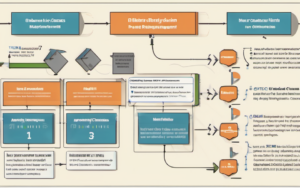The world of finance is undergoing a radical transformation, driven by the emergence of Blockchain Finance. This groundbreaking technology is poised to revolutionize traditional financial systems, offering unprecedented levels of efficiency, security, and accessibility.
The Rise of Blockchain in Finance
What is Blockchain?
At its core, blockchain is a distributed, immutable ledger that records transactions across a network of computers. Imagine a shared, public record that everyone can see but no one can change – that’s the essence of blockchain. Each block in the chain contains a record of transactions, and once a block is added, it’s permanently and securely linked to the previous block.
Key Features of Blockchain
Decentralization
Blockchain operates without a central authority, meaning transactions are validated and recorded across a decentralized network. This eliminates reliance on intermediaries and reduces the risk of single points of failure.
Transparency
All transactions are recorded on the blockchain, making them publicly viewable and auditable. This transparency promotes accountability and trust within the ecosystem.
Security
The decentralized nature of blockchain, combined with sophisticated cryptography, makes it extremely resistant to fraud and manipulation. Transactions are secured through complex mathematical algorithms, making it virtually impossible to tamper with the data.
Blockchain Applications in Finance
Cryptocurrencies
Blockchain technology serves as the foundation for cryptocurrencies like Bitcoin and Ethereum. These digital currencies offer decentralized, secure, and borderless transactions.
Smart Contracts
Smart contracts are self-executing agreements written in code and stored on the blockchain. They automate processes and ensure that agreements are executed automatically and transparently.
Digital Assets
Blockchain enables the creation and trading of digital assets, such as NFTs (non-fungible tokens), which represent unique digital ownership rights.
Decentralized Finance (DeFi)
DeFi applications leverage blockchain technology to provide financial services, such as lending, borrowing, and trading, without the need for traditional intermediaries.
Transforming Traditional Banking
Increased Efficiency and Speed
Blockchain streamlines financial processes by eliminating intermediaries and automating tasks. This results in faster transaction times and reduced processing costs.
Reduced Costs
By automating processes and eliminating intermediaries, blockchain significantly reduces the costs associated with traditional financial transactions.
Enhanced Security
Blockchain’s inherent security features make it highly resistant to fraud and cyberattacks, enhancing the overall security of financial transactions.
Improved Transparency and Trust
The transparent nature of blockchain provides greater visibility into financial transactions, building trust and accountability within the financial system.
Financial Inclusion
Blockchain has the potential to empower individuals without access to traditional banking services by providing them with secure and affordable financial solutions.
The Future of Finance with Blockchain
Tokenization of Assets
Blockchain enables the tokenization of various assets, including real estate, securities, and commodities, making them easily tradable on decentralized platforms.
Decentralized Exchanges
Blockchain-based exchanges offer secure and transparent trading environments for cryptocurrencies and other digital assets, eliminating the need for traditional intermediaries.
Programmable Money
Smart contracts on blockchain allow for the creation of programmable money, enabling complex financial transactions and automated payments.
The Rise of Decentralized Autonomous Organizations (DAOs)
DAOs are organizations governed by smart contracts on blockchain, allowing for transparent and decentralized decision-making and resource allocation.
Challenges and Opportunities
Regulatory Uncertainty
The rapid evolution of blockchain technology has created regulatory challenges, as governments struggle to establish clear frameworks for its use in finance.
Scalability and Performance
As blockchain adoption grows, concerns regarding scalability and transaction speed need to be addressed to ensure smooth operations.
Security Concerns
While blockchain is inherently secure, vulnerabilities can emerge in specific implementations, requiring continuous monitoring and security updates.
Adoption and User Education
Widespread adoption of blockchain finance requires educating users about the technology and its benefits, addressing concerns, and building trust.
A New Era of Finance
The impact of blockchain on the financial landscape is undeniable. It’s revolutionizing the way we think about money, transactions, and financial services. The future of banking and finance will be shaped by the continuous evolution of blockchain technology.
By embracing innovation and adaptation, we can unlock the full potential of blockchain finance to create a more efficient, secure, and inclusive financial ecosystem for everyone.




